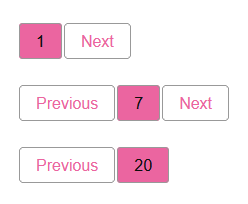tobento / service-pagination
Building pagination controls easily.
Installs: 43
Dependents: 2
Suggesters: 0
Security: 0
Stars: 0
Watchers: 1
Forks: 0
Open Issues: 0
pkg:composer/tobento/service-pagination
Requires
- php: >=8.4
- tobento/service-menu: ^2.0
Requires (Dev)
- phpunit/phpunit: ^12.3
- tobento/service-view: ^2.0
- vimeo/psalm: ^6.13
README
The Pagination Service provides a way for building pagination controls easily.
Table of Contents
Getting started
Add the latest version of the Pagination service project running this command.
composer require tobento/service-pagination
Requirements
- PHP 8.4 or greater
Highlights
- Framework-agnostic, will work with any project
- Decoupled design
- Customize rendering
- Customize url generation
Screenshots
Simple Example
use Tobento\Service\Pagination\Pagination; $pagination = new Pagination( totalItems: 200, currentPage: 3, );
Render the pagination
<?= $pagination->render() ?> // or just <?= $pagination ?>
Documentation
Pagination
Create Pagination
use Tobento\Service\Pagination\Pagination; use Tobento\Service\Pagination\PaginationInterface; use Tobento\Service\Pagination\UrlGenerator; use Tobento\Service\Pagination\MenuRenderer; $pagination = new Pagination( totalItems: 200, currentPage: 3, itemsPerPage: 50, maxPagesToShow: 10, maxItemsPerPage: 1000, urlGenerator: new UrlGenerator()->addPageUrl('#{num}'), renderer: new MenuRenderer('prev', 'next'), ); var_dump($pagination instanceof PaginationInterface); // bool(true)
With Methods
You might change some data or implentation by the following "with methods" returning a new instance.
withTotalItems
use Tobento\Service\Pagination\Pagination; $pagination = new Pagination(totalItems: 200); $newPagination = $pagination->withTotalItems(150); var_dump($pagination === $newPagination); // bool(false)
withCurrentPage
use Tobento\Service\Pagination\Pagination; $pagination = new Pagination(totalItems: 200); $newPagination = $pagination->withCurrentPage(6); var_dump($pagination === $newPagination); // bool(false)
withItemsPerPage
use Tobento\Service\Pagination\Pagination; $pagination = new Pagination(totalItems: 200); $newPagination = $pagination->withItemsPerPage(30); var_dump($pagination === $newPagination); // bool(false)
withMaxPagesToShow
use Tobento\Service\Pagination\Pagination; $pagination = new Pagination(totalItems: 200); $newPagination = $pagination->withMaxPagesToShow(6); var_dump($pagination === $newPagination); // bool(false)
withUrlGenerator
use Tobento\Service\Pagination\Pagination; use Tobento\Service\Pagination\UrlGenerator; $pagination = new Pagination(totalItems: 200); $newPagination = $pagination->withUrlGenerator(new UrlGenerator()); var_dump($pagination === $newPagination); // bool(false)
withRenderer
use Tobento\Service\Pagination\Pagination; use Tobento\Service\Pagination\MenuRenderer; $pagination = new Pagination(totalItems: 200); $newPagination = $pagination->withRenderer(new MenuRenderer()); var_dump($pagination === $newPagination); // bool(false)
Pagination Data
You might need the following data for a custom renderer, verifying page number or limiting queries.
use Tobento\Service\Pagination\Pagination; use Tobento\Service\Pagination\PageInterface; $pagination = new Pagination( totalItems: 200, currentPage: 3, itemsPerPage: 50, maxPagesToShow: 10, ); var_dump($pagination->getTotalItems()); // int(200) var_dump($pagination->getTotalItemsFrom()); // int(101) var_dump($pagination->getTotalItemsTo()); // int(150) var_dump($pagination->getItemsPerPage()); // int(50) var_dump($pagination->getItemsOffset()); // int(100) var_dump($pagination->hasPages()); // bool(true) $pages = $pagination->getPages(); // array<int, PageInterface> $pages = $pagination->getTotalPages(); // int(4) var_dump($pagination->hasPage(num: 5)); // bool(false) var_dump($pagination->hasCurrentPage()); // bool(true) var_dump($pagination->getCurrentPage()); // int(3) var_dump($pagination->getLastPage()); // null|PageInterface var_dump($pagination->getPrevPageUrl()); // string(6) "page/2" var_dump($pagination->getNextPageUrl()); // NULL
Current Page Verification
It is advised to check if the current page exists, especially if you set the current page from user input or based on a url parameter.
use Tobento\Service\Pagination\Pagination; $pagination = new Pagination( totalItems: 200, currentPage: 12, itemsPerPage: 50, ); if (! $pagination->hasCurrentPage()) { // handle if current page does not exist. // redirect, page not found or whatever fits your application design. $pagination = $pagination->withCurrentPage(1); }
Render Pagination
There are different ways of rendering the pagination depending on your needs.
Menu Renderer
The menu renderer is the default pagination renderer. It uses the Menu Service to generate the pagination HTML.
use Tobento\Service\Pagination\Pagination; use Tobento\Service\Pagination\MenuRenderer; $pagination = new Pagination( totalItems: 200, currentPage: 3, itemsPerPage: 30, renderer: new MenuRenderer(previousText: 'prev', nextText: 'next'), ); echo $pagination;
Outputs:
<ul class="pagination"> <li><a href="page/2">prev</a></li> <li class="page"><a href="page/1">1</a></li> <li class="page"><a href="page/2">2</a></li> <li class="current"><span>3</span></li> <li class="page"><a href="page/4">4</a></li> <li class="page"><a href="page/5">5</a></li> <li class="page"><a href="page/6">6</a></li> <li class="page"><a href="page/7">7</a></li> <li><a href="page/4">next</a></li> </ul>
Custom Renderer
You might write your own renderer fitting your application. The following example uses the View Service to generate the pagination HTML.
use Tobento\Service\Pagination\Pagination; use Tobento\Service\Pagination\RendererInterface; use Tobento\Service\Pagination\PaginationInterface; use Tobento\Service\View\ViewInterface; use Tobento\Service\View\View; use Tobento\Service\View\PhpRenderer; use Tobento\Service\Dir\Dirs; use Tobento\Service\Dir\Dir; use Tobento\Service\View\Data; use Tobento\Service\View\Assets; $view = new View( new PhpRenderer( new Dirs( new Dir('home/private/views/') ) ), new Data(), new Assets('home/public/src/', 'https://www.example.com/src/') ); class ViewRenderer implements RendererInterface { public function __construct( private ViewInterface $view, private string $viewToRender = 'service/pagination', ) {} public function render(PaginationInterface $pagination): string { return $this->view->render( $this->viewToRender, ['pagination' => $pagination] ); } } $pagination = new Pagination( totalItems: 500, currentPage: 2, renderer: new ViewRenderer($view), ); echo $pagination;
The view template
<?php if ($pagination->getTotalPages() > 1) { ?> <nav class="pagination"> <ul class="pagination"> <?php if ($pagination->getPrevPageUrl()) { ?> <li><a href="<?= $view->esc($pagination->getPrevPageUrl()) ?>">Previous</a></li> <?php } ?> <?php foreach($pagination->getPages() as $page) { ?> <?php if ($page->url() && ! $page->current()) { ?> <li><a href="<?= $view->esc($page->url()) ?>"><?= $view->esc($page->name()) ?></a></li> <?php } else { ?> <li><span class="<?= $page->current() ? 'current': '' ?>"><?= $view->esc($page->name()) ?></span></li> <?php } ?> <?php } ?> <?php if ($pagination->getNextPageUrl()) { ?> <li><a href="<?= $view->esc($pagination->getNextPageUrl()) ?>">Next</a></li> <?php } ?> </ul> </nav> <?php } ?> <div class="pagination-info"> <p> Showing <?= $view->esc($pagination->getTotalItemsFrom()) ?> - <?= $view->esc($pagination->getTotalItemsTo()) ?> from <?= $view->esc($pagination->getTotalItems()) ?> records. </p> </div>
Url Generation
Default Url Generator
use Tobento\Service\Pagination\Pagination; use Tobento\Service\Pagination\UrlGenerator; $urlGenerator = new UrlGenerator(); // url pattern for all pages: $urlGenerator->addPageUrl(url: 'page/{num}', placeholder: '{num}'); // url pattern for page number 1 only: $urlGenerator->addPageUrl(url: 'page', placeholder: null, page: 1); $pagination = new Pagination( totalItems: 500, currentPage: 3, urlGenerator: $urlGenerator, ); echo $pagination;
Custom Url Generator
You might write a custom url generator fitting your application design.
use Tobento\Service\Pagination\Pagination; use Tobento\Service\Pagination\UrlGeneratorInterface; class CustomUrlGenerator implements UrlGeneratorInterface { /** * Generate the url for the specified page number. * * @param int $pageNumber * @return string The generated url. */ public function generate(int $pageNumber): string { // generate the url for the specified page number. return ''; } } $pagination = new Pagination( totalItems: 500, currentPage: 3, urlGenerator: new CustomUrlGenerator(), ); echo $pagination;
Credits
Some idea and code snippets is taken from Jasongrimes php-paginator.


